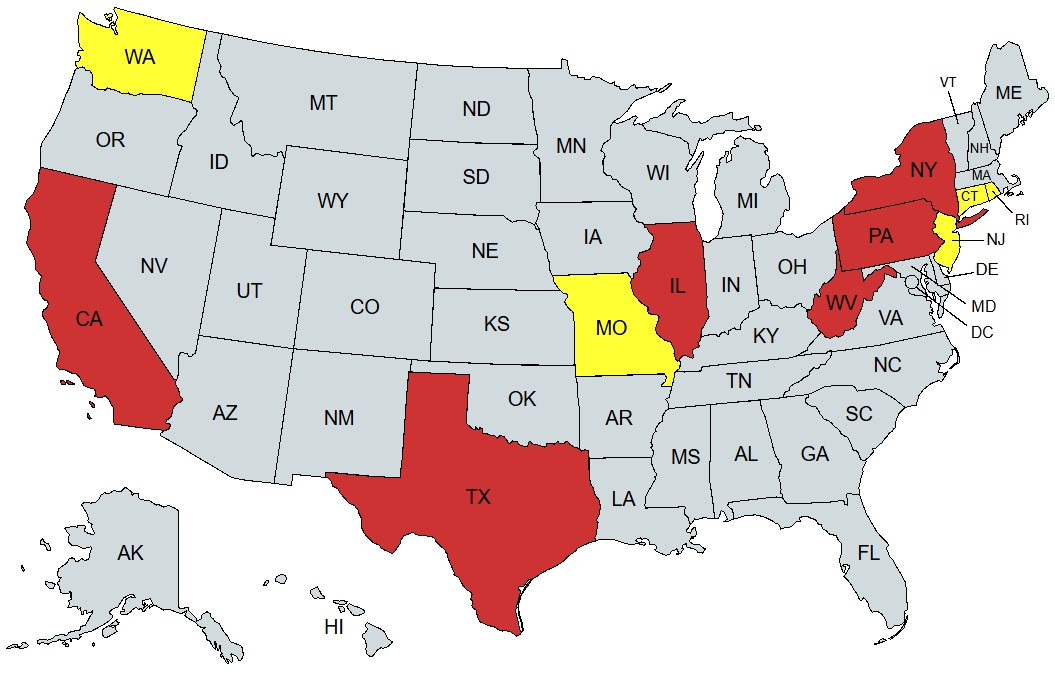Ingredient Bans Are Reshaping Food Manufacturing
Across the U.S., states are moving faster than federal regulators to ban or restrict food additives linked to health risks. These actions are setting new standards—and creating operational ripple effects for food and beverage manufacturers nationwide.

Here’s a breakdown of the most impactful legislation:
California – The First Mover
In October 2023, California passed the California Food Safety Act, banning:
- Red Dye No. 3 (linked to cancer and behavioral issues)
- Brominated Vegetable Oil (BVO) (associated with thyroid and neurological effects)
- Potassium Bromate (a suspected carcinogen)
- Propylparaben (a hormone disruptor)
These additives are tied to cancer, hormonal disruption, and hyperactivity in children. The ban takes effect in January 2027 (Food Safety Tech).
Additionally, California is banning six synthetic food dyes in school meals (including Red 40, Yellow 5 & 6, Blue 1 & 2) by the end of 2027, citing risks to children’s cognitive and behavioral health.
Texas – Warning Labels, Not Bans
Texas passed a law in June 2025 requiring foods containing 44 restricted additives—such as Red 40, Yellow 5, and BHA—to display warning labels if sold in the state. The law mirrors bans in the EU and UK and goes into effect for packaging developed after January 1, 2027 (Chron).
West Virginia – The Toughest Ban So Far
In March 2025, West Virginia became the first state to ban seven synthetic dyes and two preservatives outright, including Red 3, Red 40, Yellow 5, Yellow 6, Blue 1, Blue 2, BHA, and Propylparaben. Set to take effect in 2028, it’s the strictest regulation in the country (C&EN).
New York – Bans in Progress
New York has introduced legislation to ban several controversial additives, including Red Dye No. 3, titanium dioxide, BHA, potassium bromate, BVO, propylparaben, and azodicarbonamide.
If passed, the law would go further than California’s (NY Senate).
Illinois – Following Suit
Illinois’ proposed Senate Bill 2637 mirrors California’s law and would also ban additional additives considered unsafe by the EU (Global Food Consumers).
Pennsylvania – Focus on Synthetic Dyes
A 2024 bill proposes banning Red Dyes 3 and 40, Yellow Dyes 5 and 6, and Blue Dyes 1 and 2.
These dyes are associated with behavioral disorders and cancer risks (EWG).
More Than 30 States Are in Motion
Other states including Missouri, Washington, New Jersey, Connecticut, and Rhode Island have introduced or are drafting similar bills. These measures vary in scope but signal a growing, state-led push toward cleaner food.
Want to get more out of your ERP? Check out this whitepaper!
Read moreReformulation Is Just the Beginning
You’ve eliminated banned ingredients. You’ve updated your recipes and labels. But the real work starts now—managing the operational complexity that comes with it.
That’s where ParityFactory makes the difference.
ParityFactory: Operational Control After Compliance
ParityFactory, part of the Advantive portfolio, equips food processors to thrive in a post-compliance world:
- Inventory Intelligence
Gain real-time visibility into ingredient quantities, expiration dates, and usage patterns to minimize waste and avoid costly errors—especially important when reformulating products to meet new regulatory requirements. Stay ahead of shortages and overstock with smart, data-driven inventory management. - Lot-Level Traceability
Build regulatory confidence and customer trust with end-to-end traceability—from the receiving dock all the way to the finished product. Quickly track every lot’s journey through your facility, enabling faster recalls, smoother audits, and complete transparency. - Shop Floor Automation
Transform your production process with barcode scanning and mobile data capture, replacing manual tracking with automated precision. Shop floor automation enhances accuracy, ensures consistency, and frees up your team to focus on high-value tasks. - Production Insights
Leverage real-time production data to uncover bottlenecks, reduce unplanned downtime, and maximize throughput. With actionable insights at your fingertips, you can make smarter decisions that boost efficiency and drive continuous improvement.
Stay Compliant. Stay Competitive.
Regulations are evolving fast, and reformulation is just your entry ticket. The winners in this new landscape will be those who can adapt quickly, manage inventory smartly, and prove compliance instantly.